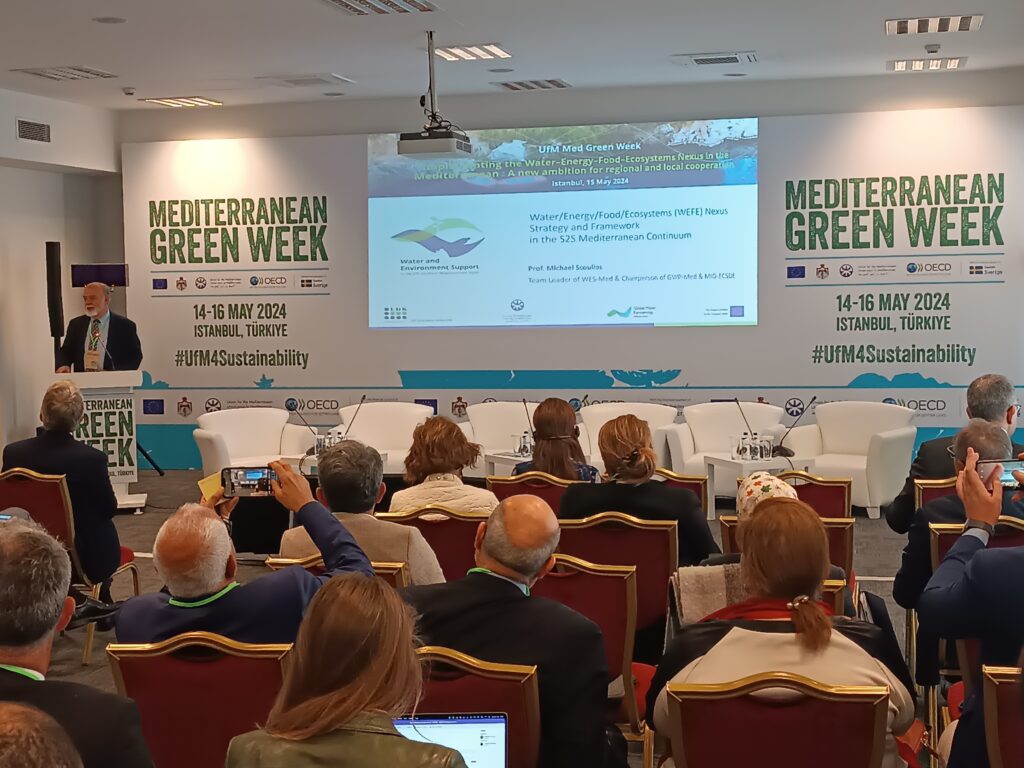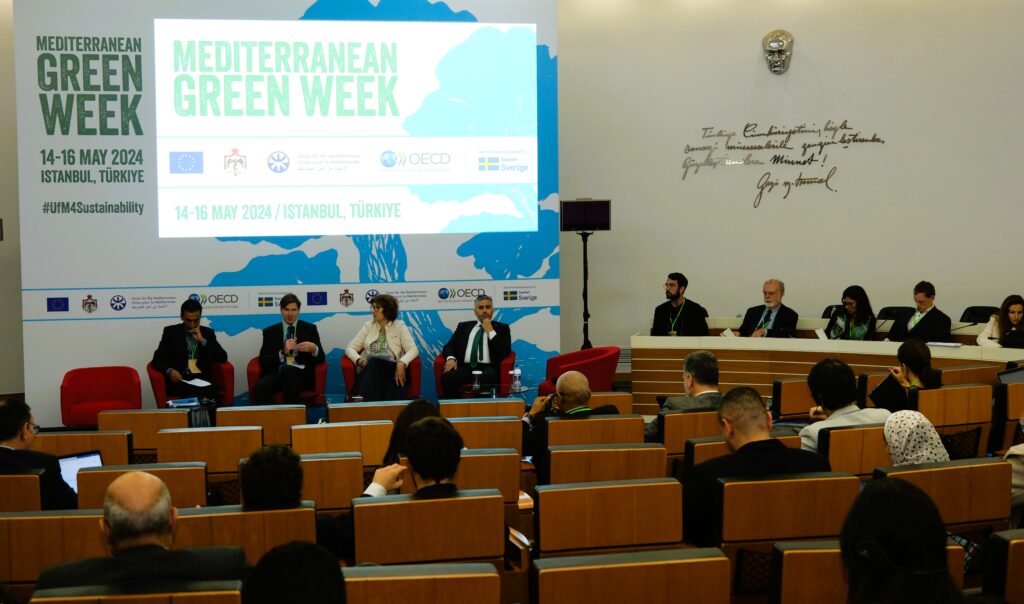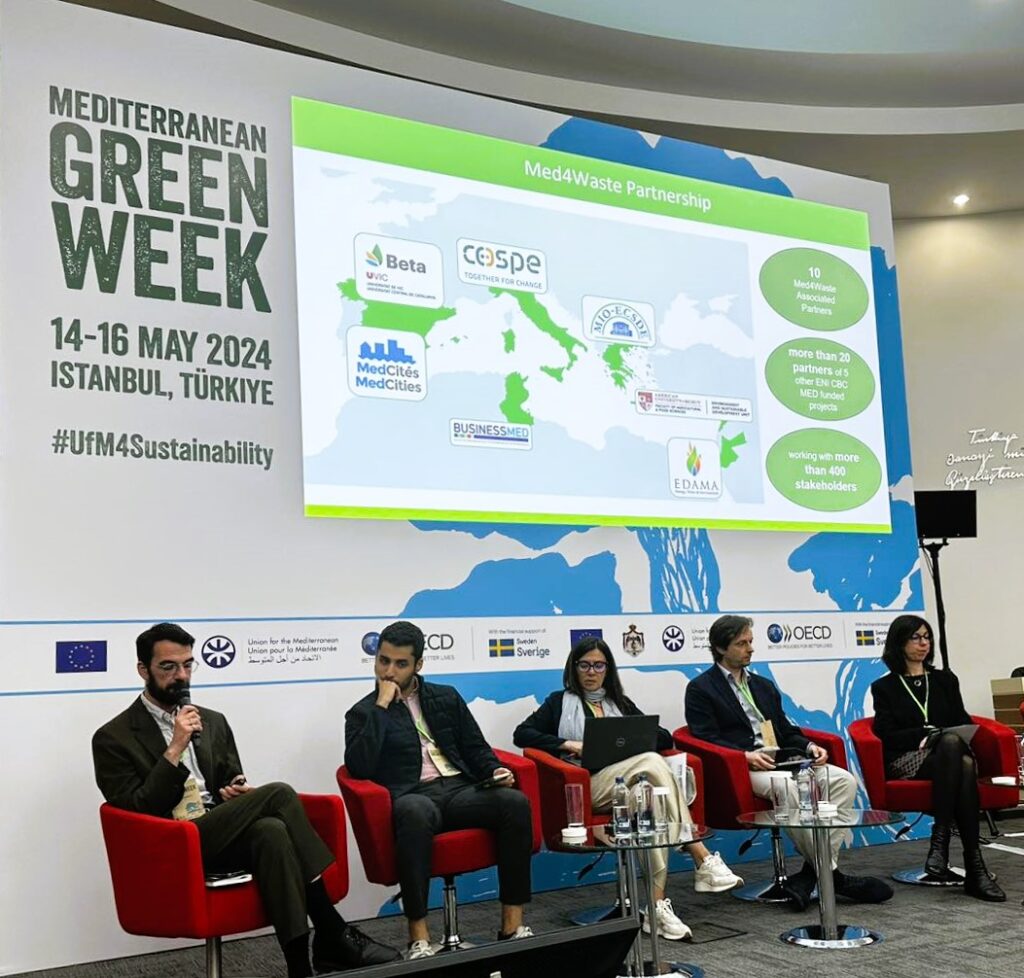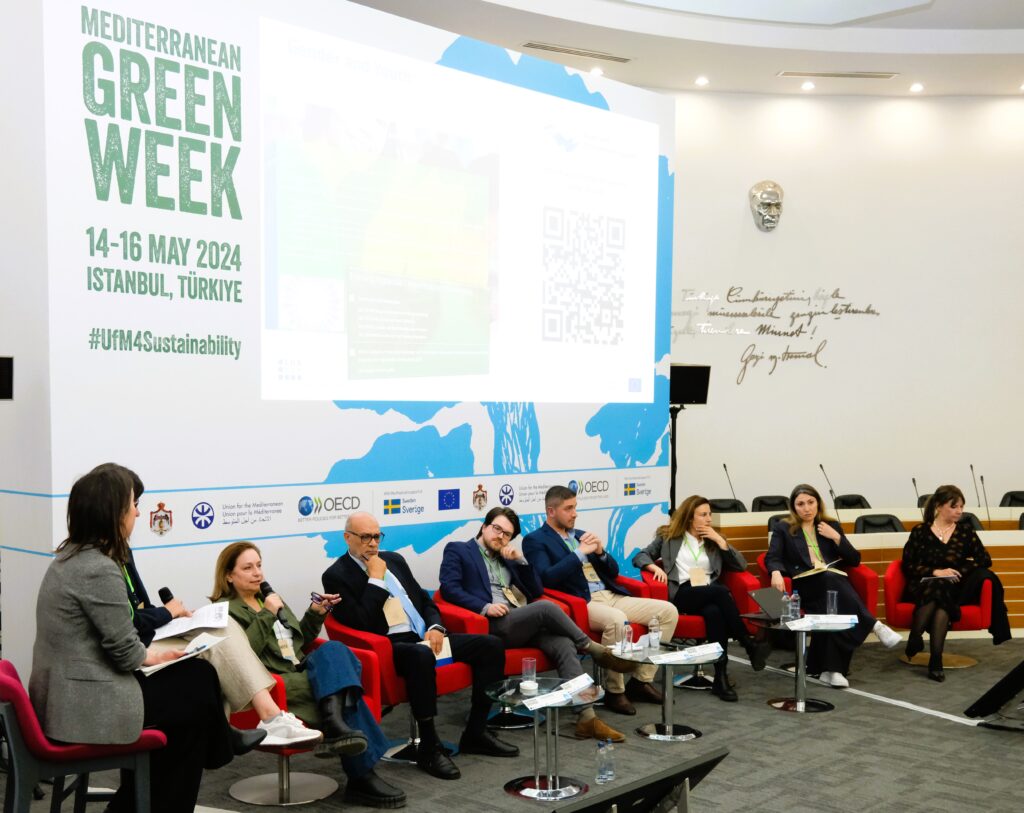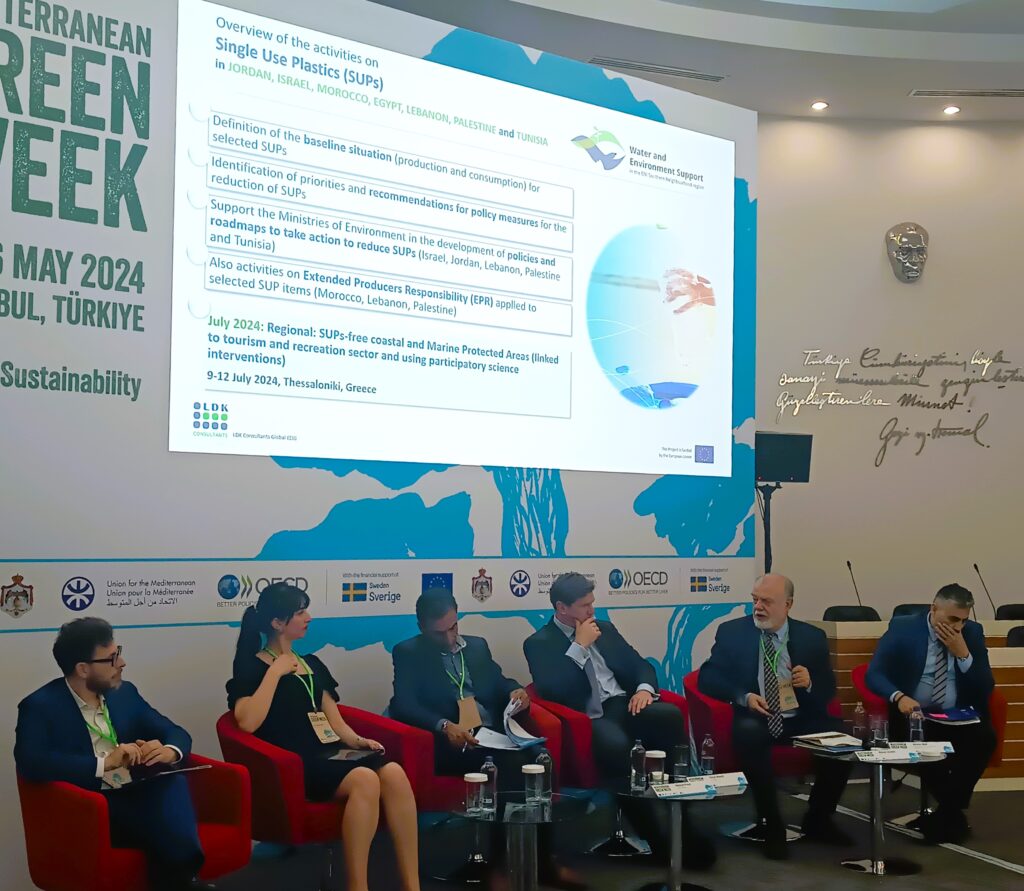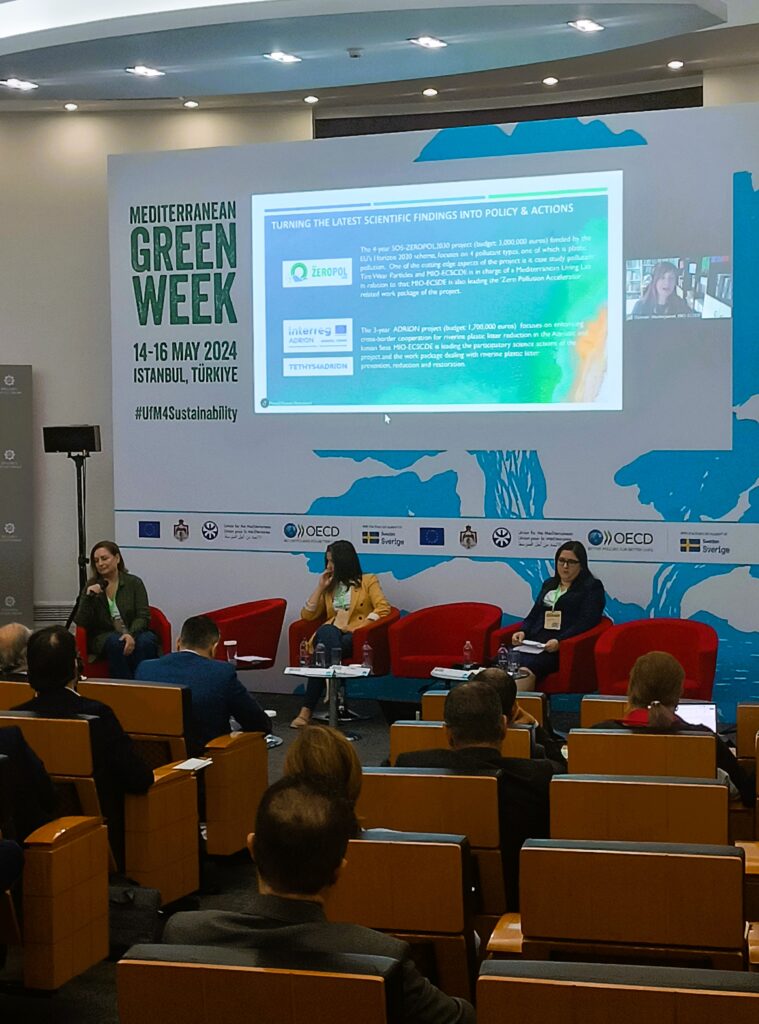The first-ever edition of the Mediterranean Green Week: Towards a Greener and More Resilient Mediterranean was held in Istanbul from 14 to 16 May 2024, and MIO-ECSDE was very active in the many plenary and parallel sessions. Co-organised by the Union for the Mediterranean (UfM) and the Organisation for Economic Co-operation and Development (OECD), this landmark event brought together 150 participants to address the region’s most pressing sustainability challenges: the ongoing triple climate, energy and environmental crisis.
The Mediterranean Green Week provided a vital platform for public officials, private sector representatives, civil society actors, young people, scientists and projects contributing to the various UfM agendas and priorities, such as the 2030GreenerMed Agenda, to explore holistic and effective solutions to these issues. Guided by this “whole-of-society” approach, participants engaged in 20 plenary and parallel multi-thematic sessions covering a wide range of topics to share knowledge, advance dialogue, collaboration and action among Mediterranean countries and stakeholders.
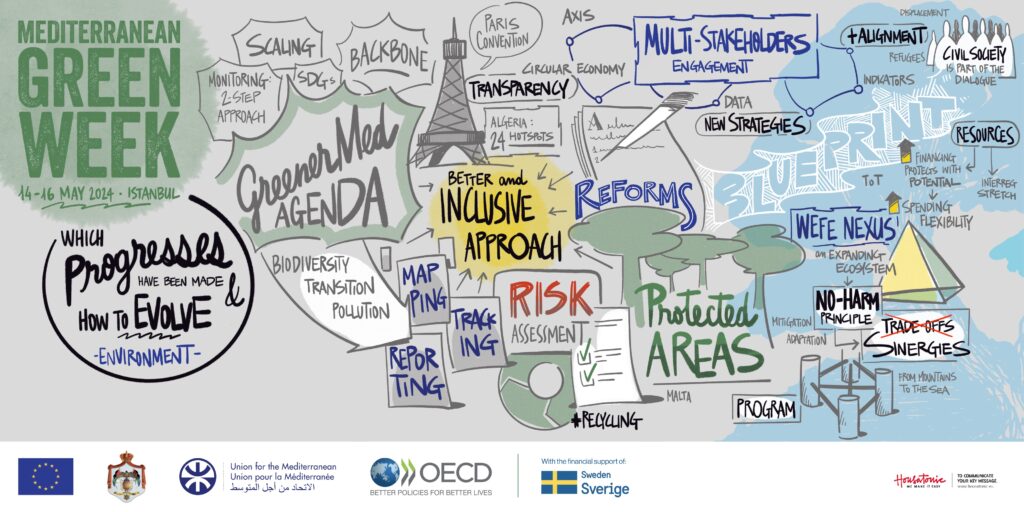
MIO-ECSDE’s participation in the Mediterranean Green Week was multifaceted over the course of the 3-day event:
- Michael Scoullos, as Team Leader of the EU-funded Water and Environment Support (WES) project, presented two policy papers, one on the UfM and Education for Sustainable Development and another on the Mediterranean Accession Agenda to the Aarhus Convention. On the 2nd and 3rd day he gave an overview of the progress on developing the Water-Energy-Food-Ecosystems (WEFE) Nexus Strategy and Framework within the Source-to-Sea (S2S) Mediterranean continuum. This significant initiative addresses a crucial issue for the region and offers Mediterranean countries an opportunity to transition to a green, circular, and socially inclusive economy making sure that none of the nexus components bears the brunt of the transition.
- As a WES Non-Key Expert, Ms Anastasia Roniotes, Head Officer at MIO-ECSDE, moderated a session dedicated to plastic waste and marine litter on Day 2 of the Med Green Week. During the same session, Dr. Thomais Vlachogianni, Senior Policy & Programme Officer, made a presentation highlighting recent MIO-ECSDE actions on the science-policy-society interface. She also referred to some of the key messages conveyed by the long-standing UfM labelled Plastic Busters Initiative, that has been steadily addressing marine plastic pollution in the Mediterranean since 2013.
- MIO-ECSDE also contributed to a dedicated civil society engagement session, with particular focus on gender and youth aspects within the role of civil society in achieving a meaningful and equitable transition in the Mediterranean. Both Ms Anastasia Roniotes, Head Officer of MIO-ECSDE, and Emad Adly, General Coordinator of RAED, emphasized key components of this process, including accountability and transparency, promoting environmental governance and Education for Sustainable Development as prerequisites for a just and inclusive transition, and the significance of designing tailored gender and youth strategies and action plans, both at institutional and project levels. The WES project’s Gender and Youth approach was showcased as one of the few projects in the region monitoring and reporting youth and gender-disaggregated data. All of these elements are vital for driving progress in the region.
- Sharing knowledge and best practices is crucial for tackling the complexities and challenges of organic waste management in the Mediterranean region. Reflecting this collaborative approach during the 8th UfM Working Group on Environment session, Haris Paliogiannis, Policy Officer of MIO-ECSDE, presented MIO-ECSDE’s involvement in Med4Waste, a capitalization project that supported many Mediterranean municipalities in this quest. With the presentation of such reports and also another UfM report on Green Circular Economy at the Mediterranean Level Including Green Skills and Jobs, the 1st UfM Green Week served to inform decision-making processes with science-based evidence.
MIO-ECSDE’s involvement in such regional platforms highlights its role as a key player in driving collaborative efforts towards a greener and more resilient Mediterranean and above all, reinforcing synergies necessary to address the multiple crises we are dealing with.
The concluding day featured a Joint Stocktaking Session, based on the two Ministerial Declarations (2nd UfM Ministerial Declaration on Environment and Climate Action – October 2021, UfM Ministerial Declaration on Energy – June 2021). Member States and stakeholders assessed their advancements so as to inform forthcoming strategies for implementation. The progress of the 2030GreenerMed Agenda, with its rigorous and participative design and implementation mechanism (including a baseline study to assess its progress against) was of particular interest.
Other documents of interest presented during the UfM Mediterranean Green Week:
- Report: Green Circular Economy at the Mediterranean Level Including Green Skills and Jobs (May 2024)
- Wildfire risk planning and prevention: innovations in the Mediterranean and beyond
- The Mediterranean Accession Agenda to the Aarhus Convention: A guide to achieving effective Environmental Governance in the Mediterranean
- Med4Waste Policy Toolkit on Municipal Waste Management: A Guide for Decision-Makers in the Mediterranean
- The UfM 2030 GreenerMed Agenda
For more information on the 1st Med Green Week click here
Read in French here
